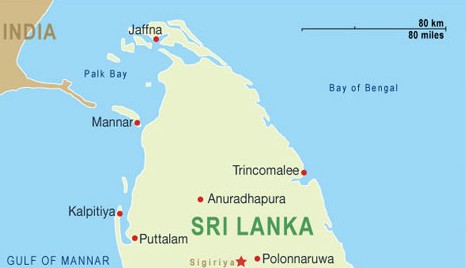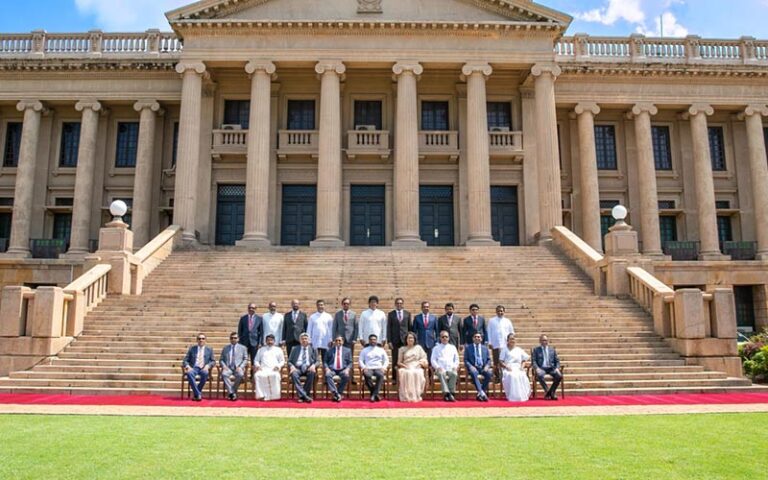
The United States says Sri Lanka has presented a ‘serious and comprehensive’ plan for reconciliation in the island nation, foreign media reports said..
Secretary of State Hillary Rodham Clinton met Friday with Sri Lankan Foreign Minister G.M. Peiris, seeking to improve ties strained by American pressure for a probe into alleged war crimes.
Video http://bcove.me/df36svcx
Clinton and other U.S. officials raised the issue Friday. It was not immediately clear how Sri Lanka responded, but State Department spokeswoman Victoria Nuland said Peiris presented a good plan on implementing the recommendations of its Lessons Learned and Reconciliation Commission made in December.
The U.S. sponsored a resolution passed by the U.N. human rights council in March, urging Sri Lanka to probe reports of thousands of civilian deaths in the final months of the conflict that ended in 2009, when the ethnic Tamil rebels’ battle for an independent state was crushed by Sri Lanka’s military.
Clinton encouraged transparency both in implementing the plan and on probing the war crimes allegations, “to strengthen reconciliation, public confidence inside and outside Sri Lanka, and, frankly, to speed the healing of the country.”
She stressed the importance of demilitarizing former conflict zones in the north of Sri Lanka, holding provincial elections there and protecting human rights and promoting civil society.
Both Clinton and Peiris also spoke on the importance of U.S.-Sri Lankan relations. Peiris referred to excellent defense cooperation and the potential for stronger economic ties.
Nuland said the U.S. was encouraged by Sri Lankan efforts to reduce its dependence on crude oil from Iran.
Meanwhile, the State Department has issued the following statement.
Remarks With Sri Lankan Foreign Minister Gamini Lakshman Peiris before their meeting
SECRETARY CLINTON: I am delighted to welcome Minister Peiris, the external affairs minister from Sri Lanka. The United States strongly supports the process of reconciliation and reconstruction in Sri Lanka. We have very strong, important ties between our two countries. We were encouraged to see the end of a very long, bloody, terrible conflict, and look forward to working with Sri Lanka as they pursue their commitment to a better future for all the people. And the United States wants to be a supportive partner in those efforts. I’m looking forward to a productive conversation with the minist
FOREIGN MINISTER PEIRIS: Well, it was exactly two years ago that I was here at the invitation of the Secretary of State, and I am delighted to be here on this occasion to have a wide-ranging discussion with the Secretary of State. During the intervening period of two years, a great deal has happened in my country, and by any standard, those developments represent a substantial accomplishment.
We have been able to complete 90 percent of the work connected with the resettlement of the people who were displaced by the conflict, and there is also a very moving story in human terms with regard to the ex-combatants who have all been rehabilitated. This includes 595 child soldiers who – they have all been reintegrated into society after the benefit of exposure to programs of vocational training which equip them to earn their living.
The most striking developments have really been in the northern province of Sri Lanka where the economy is growing by as much as 22 percent in comparison with the average for the rest of the island, which is about 8 percent. Now this is the result of an emphasis on the development of infrastructure to a degree that is really without (inaudible) at any other time in the island’s history.
This is, itself, the product of a deep conviction of ours that there is an intimate connection between reconciliation and economic development. We believe that any realistic process of reconciliation must focus upon economic factors, there must be a certain threshold of economic contentment and well-being, and emphasis on access to livelihoods and incomes. These are essential aspects of a reconciliation process. They have overriding importance, although of course we are, at the same time, addressing other aspects of reconciliation including land, language, which is a key to the understanding of other cultures, and it is also, as I’m sure you would agree, a very powerful instrument for preventing the stratification of (inaudible) society. We are also addressing, in earnest, constitutional reforms which are appropriate at this stage of the country’s political and social development.
I think I should refer very briefly to another deep conviction of ours, namely that a reconciliation process, if it is to be successful, it must reflect sensitivity to the aspirations of our people. It must have a homegrown polity. It is only then that the people of the country at large will be able to identify this process, which will then come alive in their hearts and minds.
Now, we have at this moment, a very rich and multifaceted relationship between Sri Lanka and the United States. We have as many as 5,000 students studying in the universities of the United States. And there is excellent cooperation between our two governments in the realm of defense. And only yesterday, I had a very productive meeting in the office of the United States Trade Representative, and the object of that meeting was to explore ways and means of building upon the trade and investment framework agreement which is in existence between our two countries.
And I’m convinced that today, more than ever before, with the return of stability and tranquility to our country, there is abundant scope for building further upon the relationship that is already very strong and vibrant. And that is why I’m particularly happy to be here in Washington today to meet with the Secretary of State to have a candid discussion about the future of the bilateral relationship between Sri Lanka and the United States. Thank you.
SECRETARY CLINTON: Thank you so much, minister. Thank you all.





